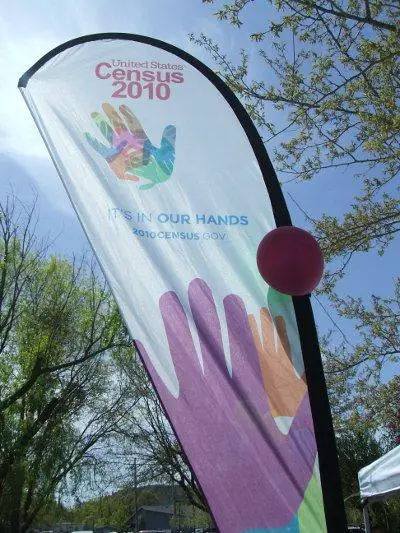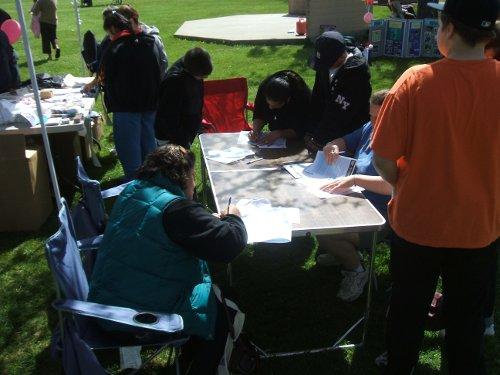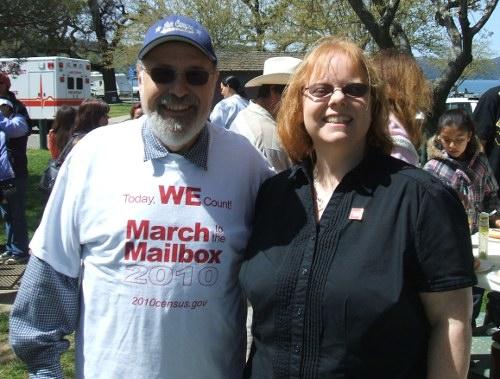NICE – After nearly a year and a half of filing appeals, writing letters and holding meetings with federal officials, last week dozens of local American Indians who had been disenrolled from Robinson Rancheria in Nice in December of 2008 began receiving certified letters from the Bureau of Indian Affairs.
While many of the ousted tribal members said they had been led to believe that the BIA was going to rule in their favor, the 11-page letter – with a stamped date of April 9 – was quite different.
“Based on the information provided, I have decided to affirm the Business Council's decision that you are not eligible to be a member of the Robinson Rancheria of Pomo Indians,” wrote BIA Acting Regional Director Dale Risling.
His letter concludes by stating that his decision is final for the BIA.
About 20 of the individuals hit with the disenrollment actions met on Friday in Nice to discuss what actions to take going forward.
They pledged to continue fighting and to seek an appeal, but one of their number, Wanda Quitiquit, noted, “We have to prepare ourselves for the true denial of our civil rights.”
Robinson Tribal Chair Tracey Avila did not return calls from Lake County News seeking comment, and directed her staff not to release to this publication a written press statement she sent to a local newspaper last week, instead suggesting that Lake County News could get the document from the newspaper.
In that statement, it was reported that 45 disenrollments had been upheld, but that number only accounts for appeals made to the BIA, according to documents submitted to the BIA by the tribe itself and obtained by Lake County News.
In fact, the names of another 22 people were removed from the tribal rolls in action taken in December 2008, according to those same documents.
Risling's letter explained that, according to tribal law, authority was delegated to the regional director to decide whether or not the actions taken by the Robinson Rancheria Citizens Business Council on Dec. 5, 2008, were legal based on the tribe's constitution.
On that date, the council – including Buffy White, Curtis Anderson Jr., Kim Fernandez, Stoney Timmons, Nicholas Medina and Chair Tracey Avila – took the final disenrollment action.
They began by disenrolling a dead woman, Marie Boggs Quitiquit – the mother of several of the proposed disenrollees – then passed 63 disenrollment resolutions for individuals including a 2-year-old child up to elders, one of them, Mildred Goforth, a native speaker of the Pomo language.
In addition, they disenrolled three other people who did not receive resolutions, for a total of 67 disenrollment actions, according to copies of the disenrollment documents and business council transcripts obtained by Lake County News.
Avila had told Lake County News in a December 2008 interview that the people whose names were removed from the rolls had been “on the table for many, many years.”
Risling's letter referred to a complicated series of past decisions by the tribal council regarding adoption ordinances and membership requirements, which was the reported basis for the disenrollment actions.
However, the Quitiquits and others whose names were stricken from the membership rolls say that they share lineage with the Anderson family, the current family in power whose members include Avila.
The group of disenrollees who met on Friday vowed to appeal the decision and keep fighting, despite the fact that they said BIA officials have told them they have no appeal alternatives.
Risling could not be reached for comment by Lake County News, with his staff reporting that he was in Washington, DC, last week.
Attempts to reach other BIA officials, including Fred Doka, who is reportedly one of Risling's deputies, also were unsuccessful.
Lake County News then attempted to reach BIA Central California Agency Superintendent Troy Burdick in Sacramento.
Although Burdick has spoken to this publication before, his staff said Lake County News needed to contact the BIA's Washington, DC press office, but refused to provide contact information.
Two calls placed to that office failed to elicit any explanations about the disenrollment action or if the people affected have any appeal or recourse.
Lake County Supervisor Denise Rushing said she was “stunned” by the decision and immediately concerned for those affected by it.
“Disenrollment has very real human impacts affecting members of our local community,” she said. “To whom can these people turn when they lose home, job, health care and income in one swift action at the hand of tribal government?”
Election matters still undecided
The Quitiquit family and other disenrollees point to contradictions in Risling's analysis of the tribe's constitution, conflicts between this action and previous actions taken by the BIA in tribal leadership matters, and to the BIA's indecision in the validity of a June 2008 election.
On June 14, 2008, the tribe's membership elected EJ Crandell as its new tribal chair, as Lake County News has reported.
However, Crandell alleges that Avila and her family members who sit on the tribe's election committee illegally invalidated that election in order for her to remain in power. Despite other elections that have taken place since that have selected other chairs, Avila remains in power.
The validity of the June 2008 election is up to Burdick to decide, but in recent meetings with Crandell and the Quitiquits, Burdick reportedly admitted that he has not made any decision on the matter.
That's a critical issue in connection to the disenrollment issue; opponents of the disenrollment said that the rightfully elected council wasn't seated at the time the actions were taken to strike the 67 members from the rolls.
Crandell and the Quitiquits also allege that the disenrollment action was taken in retaliation for Avila being voted out in June 2008. In previous statements Avila denied that. Since the disenrollment, several of those involved also are in danger of losing their homes through eviction actions.
While Risling said the business council followed the tribe's constitution in carrying out the disenrollment action, Wanda Quitiquit said that council resolutions are supposed to be released to the general tribal membership for approval, and that didn't happen.
The business council's disenrollments affected the family of Crandell's wife, and he said he believes he and other current tribal members who oppose the council are going to be targeted next.
Wanda Quitiquit agreed, saying that the BIA's decision has opened a “Pandora's box.”
She said Friday that she and her family members are concerned about whether or not they will now be barred entirely from the rancheria, including the burial sites of families and ancestors, and questioned if they will be prevented from using health care services provided through local American Indian health clinics that have funding from Robinson Rancheria.
Crandell said the business council is disregarding the wishes of the tribal members who formed the rancheria after termination, when the federal government basically dismantled the tribes.
He accused the BIA of allowing disenrollment to continue as a way of fully assimilating native peoples.
Rushing said she was concerned about what options are open to those who were disenrolled.
“Even in circumstances where disenrollment is upheld, I would hope that the tribe has a fair and just transition plan and that the BIA has an appeal process in the event that individuals civil rights are violated,” Rushing said. “I have not heard that such processes are in place, so this has the potential to be a significant justice issue.”
Disenrollment a nationwide issue
The local action to disenroll natives is not an isolated issue. In November 2007, the Elem Colony disenrolled 25 members, including the tribe's last native speaker, as Lake County News has reported.
The American Indian Rights and Resources Organization (AIRRO), a group that focuses on human and civil rights issues – to which several members of the Quitiquit family have belonged well before their own disenrollment – has tracked the issue around Indian Country.
The group's most recent estimate is that 11,000 American Indians around the United States have had their human and civil rights violated through actions taken by their own tribes.
In Northern California alone, they estimate more than 1,300 Indians have been stripped of their rights in some fashion, including disenrollment and banishment in tribes such as Pinoleville, Upper Lake, Hopland, Elem, Sherwood Valley and Potter Valley.
Nearly 2,200 more have been displaced in other parts of the state, including 770 from the Picayune Chukchanski and 440 from Pechanga, both in Southern California .
John Gomez, president of AIRRO, is one of those disenrolled from Pechanga six years ago, along with his entire family.
Over the weekend, Gomez led an AIRRO meeting in Sacramento in which the group collected stories of human rights violations.
Gomez said he's submitting those stories to the United Nations in Geneva on Monday morning as part of the United Nations' Universal Periodic Review of human and civil rights violations in the United States.
He said the United States is turning a blind eye to the growing issue of disenrollment, which he also blamed the federal government for creating through bad policies and broken treaties, including the Indian Civil Rights Act.
That 1968 law, which grew out of abuses by tribal leadership around the country, is supposed to prohibit tribal governments from creating laws that violate certain individual rights – such as freedom of religion, right to speedy and public trials, and freedom from bill of attainder and ex post facto laws, according to an explanation by the Columbia Legal Services and Northwest Justice Project in Washington state.
However, Gomez said those basic rights aren't always enforced by tribes or by the federal government. He said Indian activists have been trying to get the federal government to institute language to enforce the rights guaranteed in the Indian Civil Rights Act.
“We were hoping that under this administration it might gain some traction, but it's not a concern, it's really not on the radar right now,” with budgets and health care taking precedence, he said.
While the questions for potential Department of Interior secretarial nominees included a query about disenrollment, Gomez said Secretary Ken Salazar has done little to address the growing problem.
The United States and Canada have not signed on to the United Nations' indigenous rights declaration passed several years ago, which Gomez suggests is “because of their historical abuses of native people.”
He said many American Indians look at the United States' inability to enforce the Indian Civil Rights Act as “another broken treaty,” and a continuation of bad policies.
“Tribal officials are doing this to their people and the federal government is just not doing anything about it,” he said, with the reason being because of tribal sovereignty. “That excuse just doesn't hold water anymore.”
Even in cases where the BIA has ruled in favor of disenrollees – such as with the San Pasqual tribe – those people still have not had their rights restored by the tribe, Gomez said. “It leaves individuals and families in the same position as being disenrolled.”
Gomez accused the BIA of treating disenrollment “like a dirty little secret,” when really it's a policy failure. He suggested that members of Congress should be willing to work on the behalf of disenrollees.
He was concerned that it may take something drastic to get any action on the matter.
“Maybe Congress and the courts really won't do anything until someone gets hurt,” he said. “That might be what triggers a review of this.”
E-mail Elizabeth Larson at This email address is being protected from spambots. You need JavaScript enabled to view it. . Follow Lake County News on Twitter at http://twitter.com/LakeCoNews and on Facebook at http://www.facebook.com/pages/Lake-County-News/143156775604?ref=mf .











